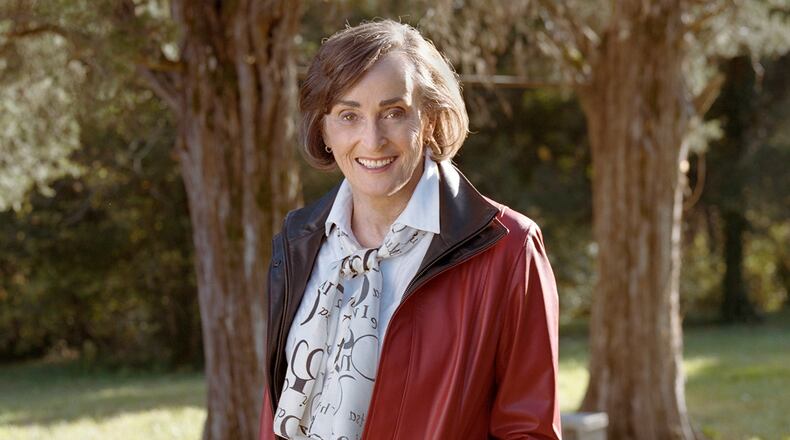Through a joyful interweaving of pragmatic storytelling and spiritual realism, Pulitzer Prize finalist Margaret Verble breathes life into a bygone era in “When Two Feathers Fell from the Sky,” a heartwarming work of historical fiction inspired by true events.
Nestled on a curvy lane in a residential neighborhood south of downtown Nashville, a historical marker is all that remains to memorialize Glendale Park. But in 1926, the Glendale Trolley Park and Zoo was a thriving entertainment complex housing mechanical rides, bears, monkeys, buffalos, and live Wild West and vaudeville shows.
The star of Verble’s narrative is “The World’s Most Thrilling and Daring Act,” the fearless Miss Two Feathers and her diving horse, Ochre. Raised on a ranch in Oklahoma by “mixed and modern Indians,” Two Feathers thirsts for equality and independence from her earliest days. She knows from the tender age of 6 that “she wanted to ride horses and shoot guns. Like the men in her family.” The famed “Doc” Carver, a fixture on the ranch, harnesses young Two Feather’s showbiz bug by teaching her his hallmarked act: the skill of horse diving.
Now grown, Two Feathers performs in Glendale Park where she mingles with a colorful cast of personalities pulled from history. Twice a day, she sits atop her mare while drinking in the audience’s adulation before plunging into the dive tank. Both woman and horse have “developed a craving for recognition, a lust for attention, and a taste for the crowd.”
But the idyllic amusement park sits atop a desecrated prehistoric Mississippian Indian burial ground. The few who remember would prefer to forget that at the end of the 19th century, 4,000 graves in the Noel Cemetery were unearthed and destroyed under the guise of Manifest Destiny and westward expansion.
In Verble’s world, ghosts from ancient times still linger, including Little Elk, a brave who has roamed the land for a century and a half. He recognizes Two Feathers as a fellow Cherokee and guards her with fierce loyalty, especially once college-educated park employee Jack Older becomes smitten with Two and aggressively pursues her.
Older feels entitled to Two. Mistakenly assuming he’s Cherokee because his parents’ farm occupied land that once belonged to the Cherokees, he gives himself the moniker Strong-Red-Wolf. Little Elk despises the weakling and does all he can to thwart Older’s efforts to woo Two Feathers using hilarious acts of spirit bravado. Being rebuffed, however, only stirs Older’s anger and fuels his determination.
Credit: Handout
Credit: Handout
One day a catastrophe occurs that forever alters Two’s life. Bolstered by her connection to the animals in the zoo and the affection of the souls surrounding her, she struggles to redefine her purpose. But more disturbances start to plague the park and it becomes apparent the animals are in danger. Although Two “wanted to fight her own fights, not have men always fight them for her,” she must come together with her friends to find the source and stop the mayhem.
Two joins forces with Clive Lovett, the park’s British manager and animal whisperer, and Hank Crawford, a coworker and the affluent grandson of a plantation owner and a slave. The threesome latch onto their faith in the mystical and allow Little Elk to guide the way. Even though Crawford knows that “telling a white person you believed in witches was like saying you believed in voodoo. A dangerous thing to do if you wanted respect.”
With her mixed roster of distinctive characters, Verble constructs a compelling environment to unpeel the layers of conflict stemming from 20th century race relations, ethnic tensions and unresolved traumas from the past. Two Feathers is mindful that “white people didn’t expect chatty Indians.” Crawford recognizes how quickly the prominence his family worked for generations to achieve could be invalidated. Glendale Park is still a place where “Negros couldn’t come by themselves, or in a group, without a white escort and a real good excuse.”
Highlighting a divisive controversy of the day, the Scope’s Trial appeal to the Supreme Court concerning the teaching of evolution in schools, Verble draws some startling parallels to our modern-day social divisions. Lovett laments, “longstanding friendships had been rent, neighbors had stopped speaking, and marriages had fallen apart. Before furthering any acquaintance, it was best to determine the other person’s position.”
By drawing from her own childhood coming up in the neighborhood built over the old Glendale Park, Verble took little kernels discovered in her youth — old trolley tracks, a giant animal bone, spooky caves — and expanded them into a magnificent story recounting a piece of Nashville history from the Native American perspective. Providing another anchor to time and place, the author pays homage to her distinguished predecessors in Southern literature by resurrecting character names pulled from the works of Peter Taylor and Alfred Lealand Crabb.
Combining meticulous research, a fresh point-of-view and vivid imagery, Verble’s third novel does what historical fiction does best: folds a compelling story into a snapshot of time before life changed. Before the automobile usurped the trolley. Before the motion picture stamped out Wild West shows. Before the Depression rescinded carefree summer days spent riding merry-go-rounds and watching a woman and her horse perform a high-dive act.
A wholesome story of hope for the future, the search for justice and ultimately a tale of human connection, “When Two Feathers Fell from the Sky” leaves the reader feeling that “we get the world we have, not the one we want. But we can make this one better.”
FICTION
“When Two Feathers Fell from the Sky”
by Margaret Verble
Clarion Mariner
384 pages, $27
About the Author
The Latest
Featured



